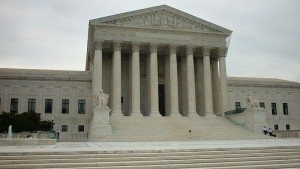 WASHINGTON — The U.S. Supreme Court has agreed to hear a challenge from several religious groups to what has been dubbed the “abortion pill mandate” in the Affordable Care Act, also known as Obamacare, marking the second time the court has deliberated opposition to the law.
WASHINGTON — The U.S. Supreme Court has agreed to hear a challenge from several religious groups to what has been dubbed the “abortion pill mandate” in the Affordable Care Act, also known as Obamacare, marking the second time the court has deliberated opposition to the law.
The Becket Fund for Religious Liberty had filed an appeal on behalf of the Roman Catholic group Little Sisters of the Poor, Houston Baptist University, East Texas Baptist University, South Nazarene University, Geneva College, Priests for Life and the Roman Catholic Archdiocese of Washington.
The entities had sued the Obama administration out of their belief that the government’s attempt at exempting them from the mandate still required them to provide abortion-inducing drugs for staff.
“We oppose taking life of the unborn from the womb,” said Dr. Robert Sloan, president of Houston Baptist University. “Having to provide these kinds of drugs or protocols that destroy the life of a fertilized egg—we’re just opposed to it. Whether a person agrees with that view or not, it’s our sincerely held belief. We believe it to our core.”
“We didn’t go looking for this fight,” he stated. “But here we stand and can do no other. We cannot help the government or anyone else provide potentially life-threatening drugs and devices. The government has many other ways to achieve its goals without involving us. It ought to pick one of those and let us go back to educating our students.”
As previously reported, the Supreme Court ruled in June of last year in favor of the popular craft chain Hobby Lobby, opining that the government could pass the provision of contraceptives onto insurance companies rather than holding business owners responsible for paying for coverage.
The Obama administration consequently revised its rules, releasing a compromise that required organizations to submit exemption forms so that their insurance company would pick up the tab for the drugs instead of the institution.
However, a number of religious groups rejected the revised rules, arguing that transferring the responsibility to pay for the drugs doesn’t assuage their concerns as they would still be helping their employees obtain the abortion-inducing medications.
“[S]igning such a form or letter facilitates moral evil,” one legal brief read. “This is true whether or not applicants pay for the objectionable coverage.”
Seven circuit courts upheld the Obamacare compromise as being reasonable. But in September, the Eighth Circuit Court of Appeals struck down the form submission requirement, concluding that “compelling their participation in the accommodation process by threat of severe monetary penalty is a substantial burden on their exercise of religion.”
The Supreme Court, which was petitioned to hear the matter in July, will likely hear the consolidated cases of the challenging organizations in April of next year and rule on the matter in June.
Become a Christian News Network Supporter...


